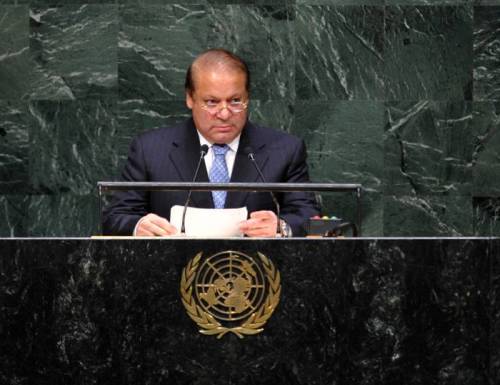
Raising the Kashmir issue yet again at the UN, Pakistan dragged the UN Military Observer Group (UNMOGIP) into the current situation along the Line of Control where cross-border shelling has flared up.
“UNMOGIP must be enabled to play its role in monitoring the ceasefire,” Pakistan’s UN Ambassador Masood Khan told the General Assembly Tuesday.
Ignoring the toll of Indian civilians from Pakistani shelling, he said: “As a result of the Indian firing yesterday, four innocent lives were lost on the occasion of Eid-ul-Azha. We call upon the Indian government to immediately cease fire and help us preserve tranquility.”
At least five Indian civilians have been killed in Pakistani shellings over the last two days. The current round to cross-border firings that began in August resumed Friday after an almost month-long lull. It has been described by Indian officials as the worst cease-fire violations since 2003.
Made up of military personnel from 10 countries, the UNMOGIP monitors the ceasefire along the Line of Control under a UN Security Council mandate.
Pakistan earlier said that Monday it had lodged a protest with the UNMOGIP over “unprovoked firing” on the Line of Control (LoC) by Indian forces.
Khan’s mention of the UNMOGIP comes after India signaled that it considers the group has outlived its utility. This is in line with India’s contention that Kashmir issues have to be dealt with solely by New Delhi and Islamabad because the 1972 Simla Agreement called for finding a bilateral solution to the dispute.
In July, India asked the UNMOGIP to vacate the rent-free bungalow it had provided near the Supreme Court. Explaining the rationale for this step, Syed Akbaruddin, external affairs ministry spokesman said that it was “consistent with India’s long-standing view that UNMOGIP has outlived its relevance”.
Khan Tuesday also invoked Prime Minister Nawaz Sharif’s Sep 26 speech to the UNGA raising the Kashmir issue: “The core issue of Jammu and Kashmir has to be resolved though negotiations, in accordance with the wishes of its people. In this regard, he (Sharif) reminded the UN of its own responsibility.”
After Nawaz’s speech, India exercised its right of reply and called his remarks “untenable”.
Abhishek Singh, a first secretary in the Indian mission to the UN told UNGA that day, “I would like to bring to the notice of this august house that the people of Jammu and Kashmir have peacefully chosen their destiny in accordance with the universally accepted democratic principles and practices and they continue to do so. We, therefore, reject in their entirety the untenable comments of the distinguished delegate of Pakistan.”
Khan also made a plea for Pakistan membership in the Nuclear Suppliers Group. “Pakistan qualifies for membership of export control regimes, especially the Nuclear Suppliers Group, and full access to peaceful uses of nuclear technology,” he said.
India, which has a partnership with the NSG, has an application pending for membership in the 48-nation organization that aims to control trading in nuclear materials to prevent nuclear proliferation. US, France and Britain support India’s membership.